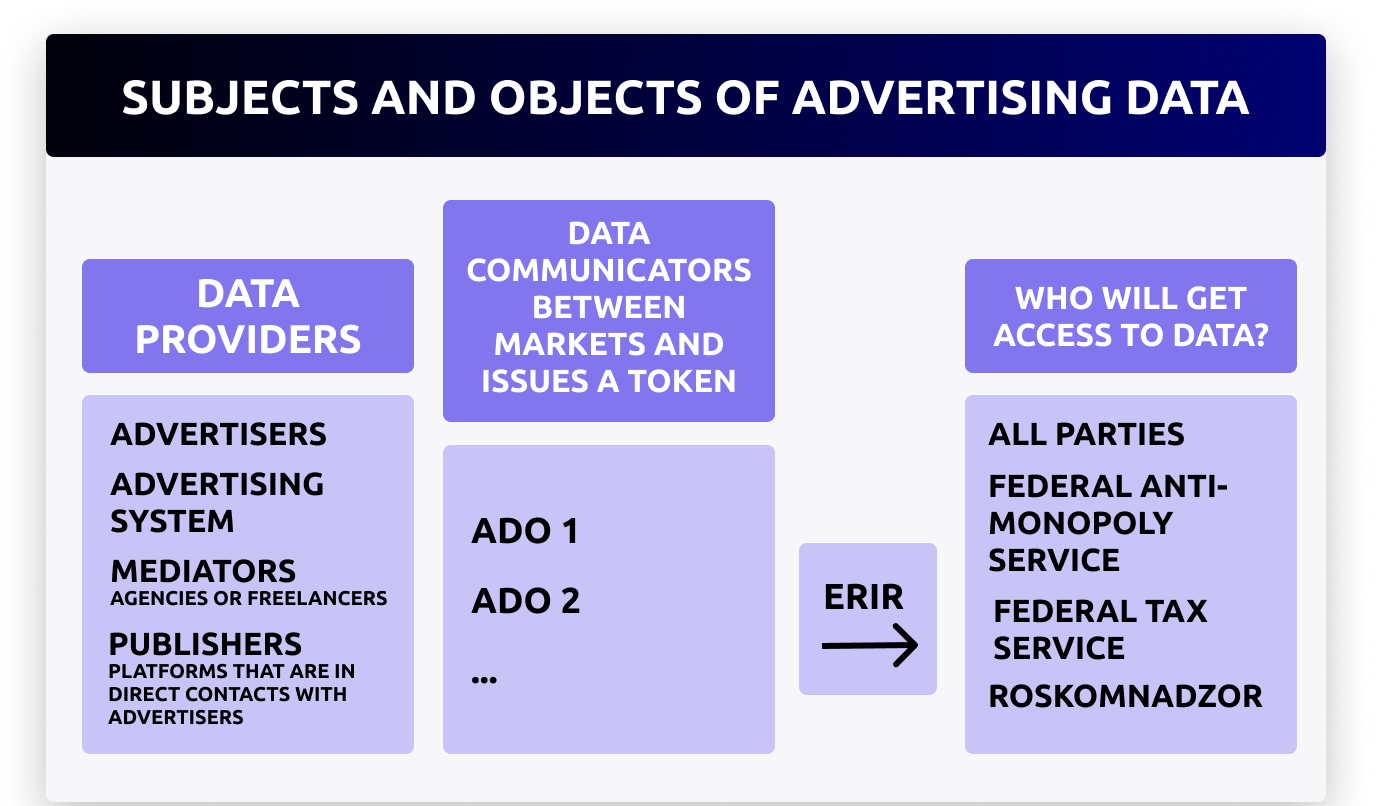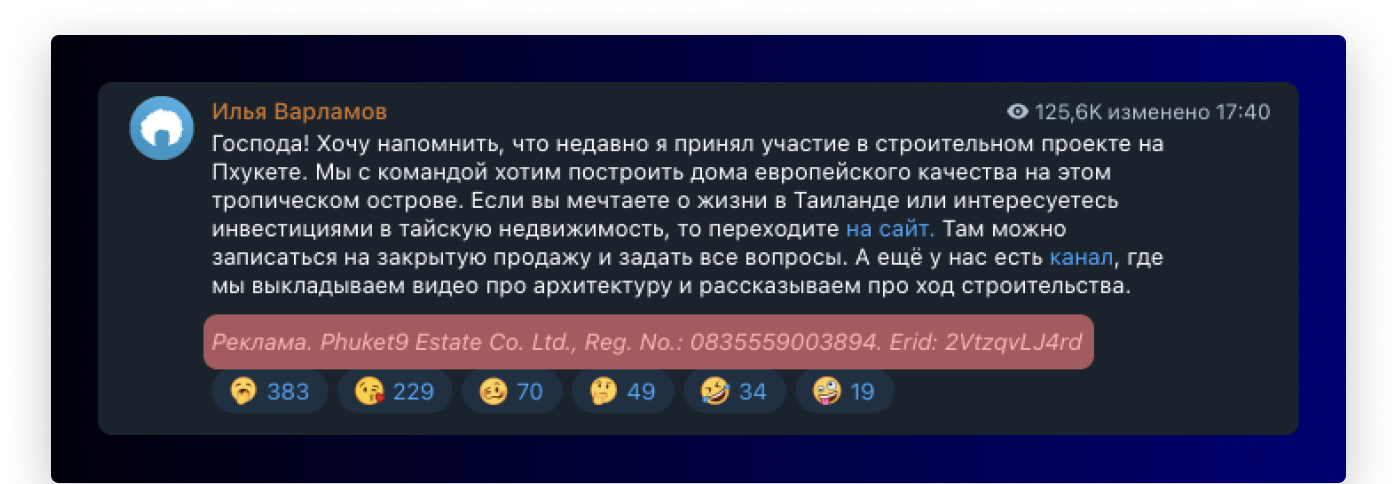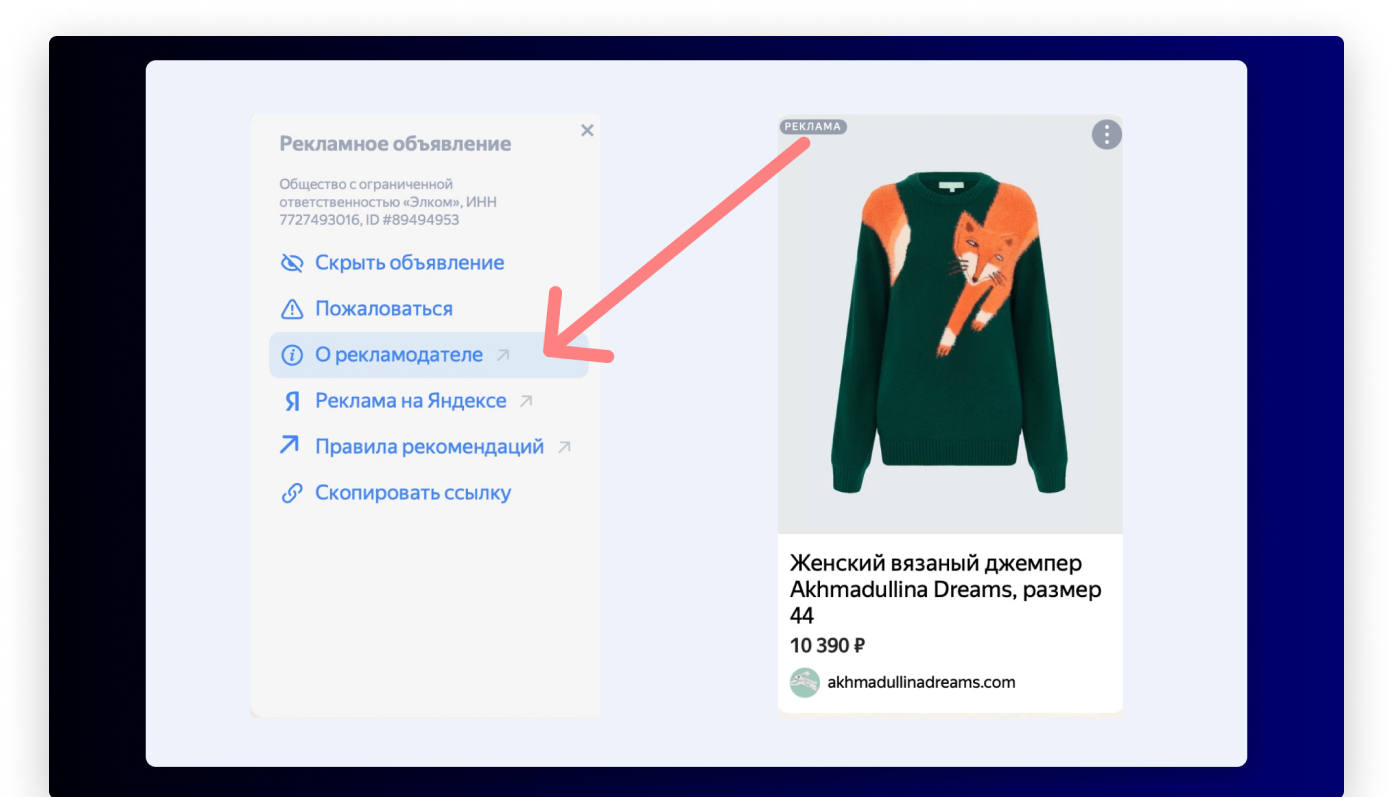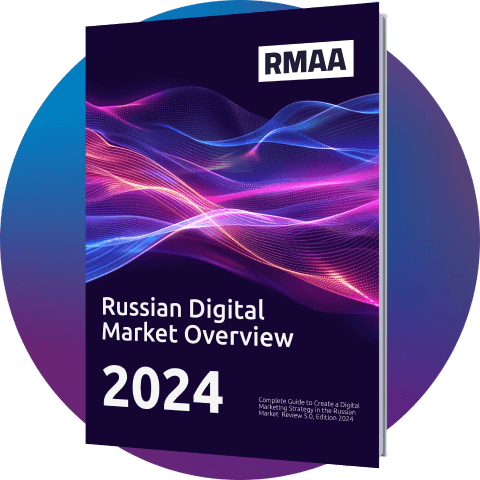Blog about successful marketing strategies in russia
Practical Guide to Digital Ad Labeling in Russia


DIGITAL MARKETING
Share this Post
There is no single law on advertising in the world, each country has its peculiarities and rules. The legislative framework in Russia has changed several times over the last 10 years. Russia's advertising laws have undergone several changes in the past decade, primarily influencing the advertising of alcohol and tobacco products, outdoor advertising, and medical products. The amendments made to the law in 2022 had a significant impact on internet advertising. Companies releasing advertising creatives on the Internet must label them to comply with Russian legislation. Failure to do so may result in fines.
Let our experts help you understand the legal aspects of advertising on the Internet in Russia.
The General Idea of Ad Labeling
To begin with, let's put it in simple terms, what the essence of ad labeling is.
When launching any online campaign, it is mandatory for both Russian and foreign companies to place tags or tokens on each advertising creative, regardless of format. Information about the campaign is then uploaded to the Unified Registry of Internet Advertising (ERIR) after one month. The database stores the complete record of campaigns, including information on the distribution of advertising materials, their placement, and cost.
Advertisers are not able to transfer the data to the ERIR independently but can do it through an intermediary service called ADO (Advertising Data Operator). Currently, there are seven primary services operating in Russia as of early 2024. The listed companies are VK Advertising Technologies LLC, MediaScout LLC, First ORD LLC, Development Laboratory LLC, ORD-A LLC, Ozon ORD LLC, and Yandex Advertising Data Operator LLC.
Additionally, starting January 1, 2025, the Unified Register of Internet Advertising (ERIR) will mandate the use of the Classifier of Goods and Services Categories (KKTU) instead of OKVED codes. Advertisers will be required to specify the appropriate KKTU code when registering advertising materials.
Data submission to ERIR can only be made through an official intermediary service, known as the Advertising Data Operator (ORD). All authorized ORDs are listed in a unified registry maintained by Roskomnadzor. As of 2025, seven primary services are operational: “VK Advertising Technologies” LLC, “MediaScout” LLC, “First ORD” LLC, “Development Laboratory” LLC, “ORD-A” LLC, “Ozon ORD” LLC, “Yandex Advertising Data Operator” LLC.
Furthermore, starting April 1, 2025, a 3% tax on revenue from online advertising will be introduced. This levy will apply to all market participants, including intermediaries between internet platforms and advertisers.

The main process of work of market participants on advertising labeling in Russia
Why did the state need this system? The answer is simple - to control the volume and budgets of internet advertising in Russia. Prior to its implementation, there was no statistical data available on this matter.
What Type of Digital Advertising Should Be Labeled in Russia?
All commercial advertising in the Russian segment of the Internet, whether paid or free, must be labeled accordingly. This includes teasers, promotional posts, contextual and targeted ads, video creatives in blogs, banners, and social media stories. It is important to note that new types of advertising are periodically added to the list.
For instance, self-promotion on a personal website is considered subject to labeling by Roskomnadzor.
This clause was not originally included in the law. However, it is important to note that there are exemptions that do not need to be labeled.
These exceptions include:
-
email newsletters and push notifications that are sent to their own clients;
-
advertising that is duplicated in the network in the same form as in the original sources on radio and TV, as specified in the order of the Government of the Russian Federation;
-
according to FAS (The Federal Antimonopoly Service), labeling is not required for advertising on Telegram if it is solely used as a messenger to communicate with subscribers and users;
-
all types of social advertising creatives, such as anti-alcohol campaigns, adverts against domestic violence, or in defense of the environment;
-
labeling for product cards on marketplaces and advertisements on online services like Avito.
All creatives placed after September 1st, 2023, must be labeled as per the law. Anything before September 1st, 2023, does not require labeling as the process was launched in a test format.
Order of Launching a Digital Advertising Step-by-Step
There are two options for the launch of an advertising campaign that is subject to internet advertising labeling requirements.
The first is an independent launch, where both the client and the distributor share responsibility. The client must sign a contract with an advertising operator and provide the necessary information in their personal cabinet.
-
For individuals: TIN (Taxpayer Identification Number), telephone number.
-
For organizations or sole proprietors (residents of Russia): TIN, company name, telephone number.
-
For companies or sole entrepreneurs (non-residents of Russia): TIN, legal form of your organization, name, country code, EPS (Electronic Payment Systems) data, country of registration number according to the international classifier OKSM (Russian Classification of Countries of the World).
Regardless of their status (individual, resident organization, or non-resident organization), advertisers are required to specify the Classifier of Goods and Services Categories (KKTU) that corresponds to the advertised product or service.
In turn, the distributor of advertising will need to:
-
Sign an agreement with the ADO.
-
Enter their data and information about the customer.
-
Specify the place of publication for the advertising creative. For example, a link to a blog in social networks, a channel on YouTube, a messenger, a Dzen site, etc.
Next, the creative is assigned a special ad identifier called a token. The campaign can then be launched.
This token is a code generated by ADO that confirms the registration of the advertising creative in ERIR. With the token, users can easily track your ad on the internet. The identifier token's location varies depending on the advertising creative's format.
Ad Labeling on the Most Popular Platforms
In a Telegram ad, it appears in text format as:

Phenomenon brand promotional post in Ilya Varlamov’s Telegram channel
In targeted and contextual advertising, the token is included in the ad post data. For instance, in this Ozon ad, information about the advertiser and token is embedded. To view it, simply hover over the advertisement. An identification code is encrypted in the link.

Advertising banner on Ozon Marketplace in support of the iPhone promotion
When launching ads through Yandex Direct and VK Ads, there is no need to label the advertisements independently. These services handle the labeling automatically on behalf of the advertiser.

Context banner of Akhmadullina Dreams brand in Yandex
Once the advertising campaign is over, the client and the advertiser must report to ADO. Reporting documents, such as contracts, work performance acts, statistics, and impression counts, must be submitted to the ADO within 30 days of placing the advertising creative. An updated report must be sent to ADO every subsequent month if a creative is displayed for more than 30 days.
It is important to note that Yandex, VK, and Ozon services are linked to the ADO. Therefore, there is no need to transfer your data every time you place an ad. You only need to fill in the information once in the advertising cabinet, and it will be automatically pulled into each campaign. The services will mark the ads and transfer all the necessary information to the ERIR.
Working with an intermediary is a quicker and more convenient way to launch an advertising campaign, especially for foreign brands. The mediator will handle all stages of registration and data uploading to the ADO.
Once the distributor finalizes the advertising creative, it can request the following information from the intermediary:
-
business name and TIN;
-
information about the contract (number, date) with the customer.
In cases where the advert is launched on platforms with integrated ADO, the intermediary enters information about the customer into his personal cabinet. Here there may be various nuances with the verification of creatives by platform administrators. Quite often brands have difficulties and misunderstandings with this. Of course, it is better to entrust this task to experts.
RMAA helps brands organize the process of working with ad labeling on the Russian market. We provide full support for companies, regardless of the type of promotion. For example, cooperation with bloggers, targeted and contextual advertising. We also know nuances related to special categories in the medical segment, etc.
Ad Labeling for Blogger Integrations
Everyone, including bloggers, needs to tag creatives, upload campaign data to the ADO, and receive tokens. If they do not wish to perform these tasks themselves, they may delegate this function to an agency or client. The RMAA frequently encounters this issue.
Since November 1, 2024, an additional requirement has been introduced alongside the obligation to label advertisements. All pages, blogs, and channels with an audience of more than 10,000 subscribers must register with Roskomnadzor and provide personal identification data. The law specifically mentions the following platforms: VKontakte, Odnoklassniki, Telegram, YouTube, Pikabu, Zen, TikTok, Twitch, Likee, Yappy, Rutube, Pinterest, and LiveJournal.
Currently, the law does not outline fines for participants in the advertising process. However, placing ads on unregistered channels carries risks. For instance, the absence of legal status for channels complicates tracking advertising results and analyzing ROI. If a page is blocked, it could disrupt the entire communication strategy.
Should penalties or liabilities for cooperation with unregistered channels become stricter in the future, companies and their intermediaries may face legal challenges and fines.
Working with micro-influencers requires special attention, as they often operate as private individuals without tax and legal registration of their activities. In this case, we enter into a contract with them and take on all obligations to the state authorities, including the payment of taxes and insurance contributions to the state budget.
Therefore, only agencies with sufficient organizational resources (lawyers and document management specialists) can operate professionally in the Russian market today. The new advertising legislation introduced by the Russian state has created a bureaucratic burden that is proving to be a challenge for freelancers and small businesses.
This is how the advertisement for "JSC Tinkoff Bank" looks in a Telegram posted by blogger Dima Maslennikov, which includes the advertiser's details and ERID at the end of the text.

Promotional post for Tinkoff brand in the Telegram channel of Dmitry Maslennikov
This is an example of targeted advertising on VKontakte. The advertiser's information is easily accessible in the menu located in the upper right corner.

Targeted advertising of VK Clips service in VK
Below is an example of labeling a YouTube video. At the bottom of the screen, you will see a tag that reads 'Advertisement', along with the name of the customer and ERID, which is a unique token.
Advertising of the Samokat service on Ida Galich’s YouTube channel
According to Roskomnadzor, labeling advertising on Instagram* is required. But the FAS has clarified that labeling is not mandatory due to the official ban of the social network in Russia. It is advisable to seek clarification from the relevant state authorities to ensure compliance. However, as a digital agency, we always support labeling creatives on Instagram*. Improper design and lack of creative labeling can result in penalties, regardless of the social network.
An example of an advertising post on an Instagram* blog (ad labeling is located at the bottom of the Reels screen):
Advertising post for the Werfstore brand on the Instagram* account of blogger Ksenia Sobchak
Penalties for Incorrect Ad Labeling
Labeling violations can result in a fine of up to 500,000 rubles (approximately $5500) for both the customer and the distributor. The amount depends on the status: companies, individual entrepreneurs, and officials will face different penalties.
|
|
|
|
|
|
|
|
|
|
|
|
For running an advertising campaign without a token or placing it incorrectly:
|
|
|
|
|
|
|
|
|
|
|
|
For failing to transfer information about the campaign to Roskomnadzor, or transmitting data after the deadline, or transmitting false data:
|
|
|
|
|
|
|
|
|
Additionally, companies will not be able to include advertising expenses in their tax-deductible costs if the advertisements are placed in violation of the law.
Let's Summarize
Labeling online advertising can pose a significant obstacle to promoting many brands, particularly foreign ones, in Russia. You can confidently delegate all these difficulties to RMAA specialists. Our experts are ready to provide you with qualified assistance in the development and launch of campaigns on any platform, including work with the labeling of advertising materials on the Internet.
For a more detailed overview of the digital structure of the Russian market, including legislative aspects, please refer to our White Paper "Russian Digital Market Overview".
Stay informed about the latest trends in digital marketing by subscribing to our blog.
*Meta Platforms Inc. project, the activities of which are banned in Russia.
Join 2,000+
of your Peers!
You will be the first to know about Russian marketing insights, news and updates from our agency. Stay tuned!
Get our latest articles delivered to your email inbox and get our exclusive White Paper
"Digital Marketing in Russia. Finding your customers on the internet"
for FREE!
Russian Digital Market Overview
Strategic Insights into Russian Digital Marketing Landscape

Ready to partner with the specialists in Russian marketing and advertising?
About the Author
Digital Strategist. Head of one of the project groups at RMAA. Maria started her journey in digital marketing in 2009.
Join 2,000+ of your Peers!
Get our latest articles delivered to your email inbox and get our exclusive White Paper "Digital Marketing in Russia. Finding your customers on the internet" for FREE!
You will be the first to know about Russian marketing insights,
news and updates from our agency.
Stay tuned!
We're updating our website's design step by step, so some pages may look different. Thank you for your understanding.
Got it














